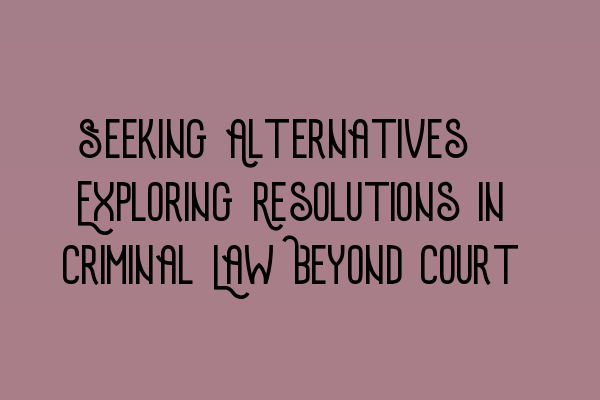Seeking Alternatives: Exploring Resolutions in Criminal Law Beyond Court
Welcome to the SQE Criminal Law & Practice Law UK blog, where we aim to provide insights and information on various aspects of criminal law. In this article, we will delve into the concept of seeking alternatives to court proceedings in criminal cases. With the rise in alternative dispute resolution methods, it is crucial for legal professionals to be aware of the options available beyond traditional courtroom battles.
Understanding Alternative Dispute Resolution
Alternative dispute resolution (ADR) refers to the methods used to resolve legal conflicts outside the traditional litigation process. It offers parties involved in criminal cases an opportunity to reach mutually acceptable resolutions through negotiation, mediation, or arbitration.
While court proceedings have their place in ensuring justice is served, ADR provides several benefits, including faster resolution, cost-effectiveness, and a more collaborative approach. By exploring these alternatives, legal professionals can offer their clients a wider range of options tailored to their specific needs.
The Role of Mediation in Criminal Cases
One popular form of ADR in criminal law is mediation. Mediation involves a neutral third party facilitating discussions between the victim and the offender to reach a mutually satisfactory resolution. This approach focuses on dialogue, understanding, and empowerment rather than a punitive approach.
Mediation offers a safe space for both parties to express their concerns and find common ground. It encourages accountability, empathy, and communication, which can lead to transformative outcomes in criminal cases. Additionally, mediation can help reduce the burden on the court system, allowing quicker resolution for non-violent offenses.
Interested in SQE 1 Preparation? Check out our SQE 1 Preparation Courses.
Arbitration for Disputes in Criminal Law
Arbitration is another ADR method gaining traction in the criminal law arena. It involves a neutral arbitrator or panel making a binding decision based on the evidence and arguments presented. While arbitration is more formal than mediation, it still offers advantages over traditional trials.
Arbitration allows parties to tailor the process to their needs, such as choosing their arbitrator and setting the timeline. It can be particularly useful in resolving complex cases where specialized knowledge is required. By opting for arbitration, legal professionals can help their clients avoid lengthy court proceedings while maintaining the fairness and impartiality of the resolution process.
Looking for SQE 2 Preparation? Explore our comprehensive SQE 2 Preparation Courses.
Restorative Justice: Healing and Rebuilding
Restorative justice is a unique approach that emphasizes healing, rebuilding relationships, and addressing the harm caused by criminal activities. It brings together the offender, victim, and affected community members to collaboratively find ways to repair the harm and prevent similar incidents in the future.
Restorative justice recognizes that criminal acts not only impact individuals but also the broader community. By engaging all stakeholders, it encourages accountability, rehabilitation, and reintegration. This approach can be especially effective in cases involving non-violent offenses or when the victim seeks closure and wishes to have a voice in the resolution process.
Curious about the SRA SQE Exam Dates? Check out the latest SRA SQE Exam Dates.
Conclusion
As legal professionals, it is crucial that we explore alternatives to court proceedings and stay informed about the growing landscape of alternative dispute resolution methods. Mediation, arbitration, and restorative justice offer unique opportunities to find resolutions that prioritize collaboration, efficiency, and personalized outcomes.
If you’re interested in further preparation for the SQE exams, we recommend checking out our SQE 1 Practice Exam Questions and SQE 1 Practice Mocks FLK1 FLK2 articles. These resources can help you fine-tune your knowledge and skills for a successful career in criminal law.
At SQE Criminal Law & Practice Law UK, we are committed to providing the highest quality resources and training support for aspiring legal professionals. Stay tuned for more informative articles on various aspects of criminal law and practice!
